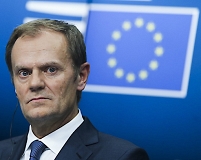Erstellt am: 19. 12. 2014 - 14:28 Uhr
The group formerly known as Islamic State
Among the many problems associated with the group calling themselves "Islamic State" is what to call them: ISIS, ISIL, IS....?
That might sound flippant when talking about the group that has shocked even Al Qaeda with its brutality and extremism, but bear with me.
It's very clear that they are neither Islamic, nor a state - so using the name they claim gives them a legitimacy they do not and should not have. The Islamic State is also part of the other two popular acronyms, ISIS and ISIL,
While politicans and analysts have juggled with the options, those of us reporting on the developments have tried to keep up, at the same time as trying to be clear, correct and not taking up all the time available to us on the name.
Now, General James Terry has come to the rescue with "Daesh" - an Arabic acronym that doesn't carry any of the baggage of the English equivalents.
I, for one, am very happy take the lead from our analyst, Paul Beaver, and join what I am sure will be the media stampede into using the new (well, new to us) name.
Coincidentally (or maybe not) the new name coincides with a major defeat for Daesh at Mount Sinjar. A coordinated attack including US and allied air strikes and a ground attack by thousands of Kurdish Peshmerga forces has broken the siege that had trapped hundreds of Yazidis and other Iraqis on the mountain since August.
Paul says this could be a turning point in the war, especially put together with increasing failures in their communications systems and vulnerability to "spoofs" by western intelligence services.
All in all, it seems appropriate that the group is also having its name cut down to size, and its interesting to note that "Daesh" is a name the group's leaders hate.
Dieses Element ist nicht mehr verfügbar
Following on from Daesh, Saliha Jaffer, of Families Against Stress and Trauma , who was recently in Austria as a guest of Women without Borders, has some fascinating insights into radicalisation and how the families of people who become radicalised are affected.
Her stories of individual cases are touching and poignant, and really bring home how wide reaching the problem of radicalisation is.
Dieses Element ist nicht mehr verfügbar
Also on the programme:
Tusk talks tough on Russia

EPA/OLIVIER HOSLET
Former Polish President and chairman of the EU summit, Donald Tusk, is calling for the EU to come up with a tough long term policy on Russia.
Adam Easton reports from Warsaw on why Poles feel particularly strongly about Russia and Ukraine, and why Tusk will bring a new slant to EU policy in his job as President of the European Council.
Dieses Element ist nicht mehr verfügbar
Tunisia's political see-saw
As Tunisia heads into the last round of presidential elections, Cengiz Gunay looks at the instability beneath the apparent democratic success in the first of the Arab Spring countries.
Dieses Element ist nicht mehr verfügbar
The nature of compassion
Ahead of tomorrow's Reality Check Special on humanitarian aid, psychologist Michael Tomasello explains how compassion develops in human and animal societies.
Dieses Element ist nicht mehr verfügbar
FM4 Reality Check
Monday to Friday from 12.00 to 14.00, and after the show via Podcast or fm4.orf.at/realitycheck.


